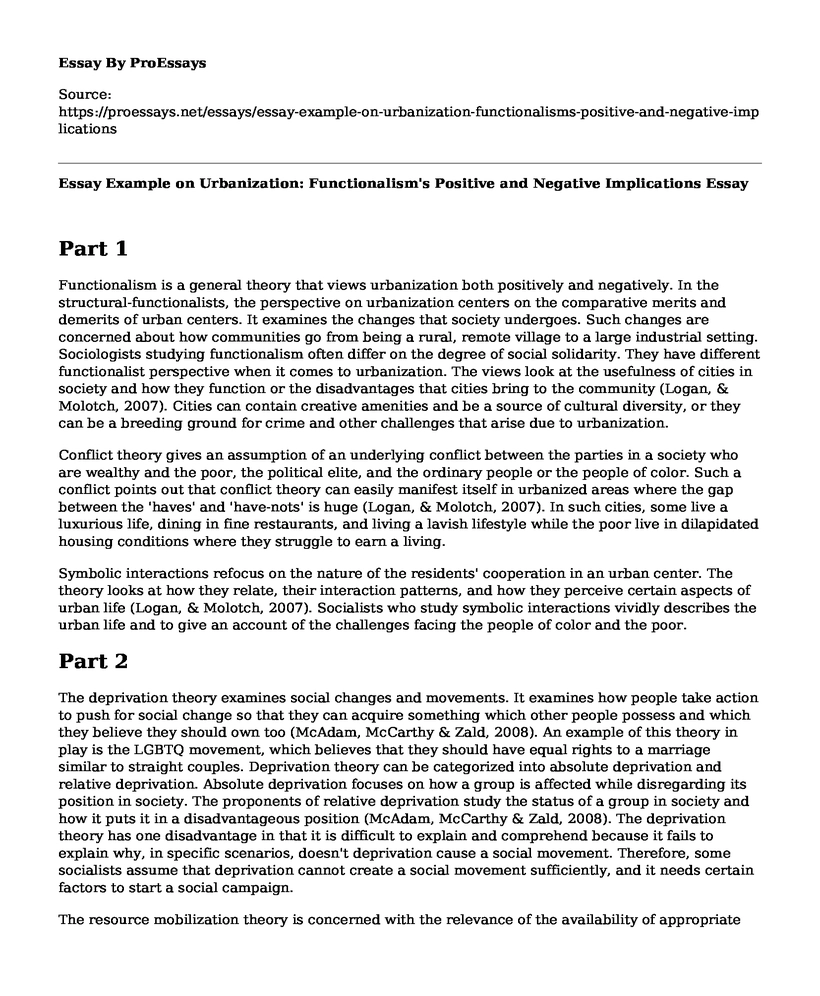Part 1
Functionalism is a general theory that views urbanization both positively and negatively. In the structural-functionalists, the perspective on urbanization centers on the comparative merits and demerits of urban centers. It examines the changes that society undergoes. Such changes are concerned about how communities go from being a rural, remote village to a large industrial setting. Sociologists studying functionalism often differ on the degree of social solidarity. They have different functionalist perspective when it comes to urbanization. The views look at the usefulness of cities in society and how they function or the disadvantages that cities bring to the community (Logan, & Molotch, 2007). Cities can contain creative amenities and be a source of cultural diversity, or they can be a breeding ground for crime and other challenges that arise due to urbanization.
Conflict theory gives an assumption of an underlying conflict between the parties in a society who are wealthy and the poor, the political elite, and the ordinary people or the people of color. Such a conflict points out that conflict theory can easily manifest itself in urbanized areas where the gap between the 'haves' and 'have-nots' is huge (Logan, & Molotch, 2007). In such cities, some live a luxurious life, dining in fine restaurants, and living a lavish lifestyle while the poor live in dilapidated housing conditions where they struggle to earn a living.
Symbolic interactions refocus on the nature of the residents' cooperation in an urban center. The theory looks at how they relate, their interaction patterns, and how they perceive certain aspects of urban life (Logan, & Molotch, 2007). Socialists who study symbolic interactions vividly describes the urban life and to give an account of the challenges facing the people of color and the poor.
Part 2
The deprivation theory examines social changes and movements. It examines how people take action to push for social change so that they can acquire something which other people possess and which they believe they should own too (McAdam, McCarthy & Zald, 2008). An example of this theory in play is the LGBTQ movement, which believes that they should have equal rights to a marriage similar to straight couples. Deprivation theory can be categorized into absolute deprivation and relative deprivation. Absolute deprivation focuses on how a group is affected while disregarding its position in society. The proponents of relative deprivation study the status of a group in society and how it puts it in a disadvantageous position (McAdam, McCarthy & Zald, 2008). The deprivation theory has one disadvantage in that it is difficult to explain and comprehend because it fails to explain why, in specific scenarios, doesn't deprivation cause a social movement. Therefore, some socialists assume that deprivation cannot create a social movement sufficiently, and it needs certain factors to start a social campaign.
The resource mobilization theory is concerned with the relevance of the availability of appropriate resources in the emergence of a social movement. This theory proposes that if specific individuals in a society are not satisfied or have some grievances, they can be able to mobilize appropriate resources so that they can alleviate their complaints. In this context, the term resources refer to finance, political issues, and even social status (McAdam, McCarthy & Zald, 2008). This theory explains why particular grievances result in successful social movements and why some complaints may not cause social change. Most critics have the assumption that this theory is entirely materialistic, and the presence of appropriate resources motivates it.
Reference
Logan, J., & Molotch, H. (2007). Urban Fortunes: The Political Economy of Place (2nd ed.). Berkeley, CA: University of California Press.
McAdam, D., McCarthy, J., & Zald, M. (2008). Comparative perspectives on social movements (pp. 695-737). Cambridge: Cambridge University Press.
Cite this page
Essay Example on Urbanization: Functionalism's Positive and Negative Implications. (2023, Mar 16). Retrieved from https://proessays.net/essays/essay-example-on-urbanization-functionalisms-positive-and-negative-implications
If you are the original author of this essay and no longer wish to have it published on the ProEssays website, please click below to request its removal:
- Analysis of Class and Virtue Essay by Parenti
- Mental Health and Stigma Essay
- Essay Sample on Wonder Woman: Exploring Feminine Intuition Through Visuals & Narrative
- Essay Example on God Bless the Child: US Response to Juvenile Prostitution
- Essay on Gender Roles in Modern Society: How Kids Learn Societal Expectations
- Power Dynamics: Influence and Control in Relationships - Essay Sample
- Marital Status & Family Income: An Interpretation of the Model Coefficients







